- Home
- Vince Flynn
Separation of Power Page 3
Separation of Power Read online
Page 3
Americans had grown soft with all of their rights and personal freedom. They had no idea how harsh the rest of the world was. On the surface most Americans would be shocked by the things he had done. But they would be shocked from the comfort of their homes, having no idea what things were like in the Middle East. Women would judge him the harshest, and they would do so without thinking how they would be treated by the men he killed. Women in these fundamentalist Islamic communities weren't even treated as second-class citizens. They were property owned by their fathers, and then by their husbands once a marriage was arranged. No, America didn't have the stomach to be confronted with what he had done. That was why secrecy was essential.
Rapp stood and looked out the window of his small Cape Cod style home. Down below, the water of the Chesapeake Bay looked cold. All of the leaves were off the trees and the cold gray skies of November had settled in. Standing in only his boxers, Rapp shivered briefly and then headed downstairs. There wasn't much enthusiasm in his step as he descended. He had a ten o'clock meeting at Langley that he had some serious reservations about. When he reached the first floor his new best friend Shirley the mutt was waiting for him. The dog was incredibly smart: and obedient. Rapp patted her on the head and said hello. He had picked her up at the Humane Society one night several weeks earlier. Rapp had needed the canine to give him a little cover for some lurking that he had to do. Due to his normal unreliable schedule owning a pet was out of the question, but things were about to change. His days of globe-trotting were over. Or at least he hoped.
Rapp entered the kitchen to find the love of his life sitting at the table eating a bowl of cereal and reading the Post. He walked over and kissed Anna on the forehead. Without saying anything he went straight for the coffeepot and poured himself a cup. No sugar, no cream, just straight black coffee.
Anna Rielly swallowed a mouthful of cereal and looked up at Rapp with sparkling green eyes. "How are you feeling this morning?"
"Like shit." He moved his shoulder around in an effort to loosen it.
"What's wrong?"
"I'm getting old. That's what's wrong." Rapp took his first sip of the hot black liquid.
Rielly grinned. "What are you talking about? You're only thirty two."
"I might as well be sixty-three with the life I've lived."
Rielly studied her man for a second. They had met under the strangest of circumstances, and at the time she didn't realize how ruggedly handsome he was. But she'd had ample time to notice since. She looked at Mitch's olive-skinned body. There wasn't an inch of fat on the man. He was one lean muscle from his broad shoulders to his sleek calves. There were some flaws, although Rielly never thought of them that way. Mitch liked to refer to these flaws as the chinks in his armor. Rapp had three visible bullet holes: one on his leg and two more on his stomach. There was a third, she knew, but that one was covered up by a thick scar on his shoulder where the doctors had torn him open to get at the bullet, pull out the bone fragments and reconstruct his shoulder socket. Besides that there was a scar left by a knife that had skewered his right side. And there was one more scar that he was particularly proud of. It was a constant reminder of the man he had sworn he would kill when he started on his crazy journey ten years ago. It ran along the left side of his face, from his ear down to his jawline. The plastic surgeons had done a great job minimizing the mark to a thin line, but more important to Rapp, the man who had given him the scar was now dead.
Rielly smiled at Rapp and stuck out her arms. "I think you look great."
"I still feel like shit." Rapp stayed where he was, leaning against the kitchen counter.
"My, you're in a sour mood this morning." Rielly let her arms drop. She studied Mitch briefly and then it dawned on her what was bothering him. "You don't want to go see Irene today, do you?" Rapp mumbled into his coffee cup and Rielly said, "I knew it."
"It's not Irene. I don't mind Irene I look forward to seeing Irene."
"Then it's going to Langley?"
"Yeah I don't know I suppose." Rielly had worried about this, but had kept it to herself. Rielly was a reporter and her job was to observe things people, really. From what she observed as NEC's White House correspondent, she had serious doubts as to whether Mitch could make the transition from undercover operative to bureaucratic employee. He was too used to calling the shots and working on his own. At Langley he would have, to be part of a team, and he would have to take orders. But worst of all, Rielly knew, was that he would have to watch what he said. Washington was a town where people often wanted to hear anything but the truth.
Rielly stood and went over to him, kissing him on the cheek. "Whatever you decide to do, honey, I will support you. If you want to stay at home and raise the kids I would think that's just great."
Rapp set his mug down and held up his hands, forming a "T" like a basketball referee. "Technical foul. No overt discussion of marriage, weddings or children until you have a ring on your finger."
Rielly scoffed at him. "That's your stupid rule, not mine. You know we're going to get married, and I know we're going to get married." She pinched his waist and with a playful smile said, "So let's get the show on the road."
Rapp grabbed her by the shoulders. "I've been just a little busy lately." He glanced over at a spot on the other side of the kitchen where just two weeks earlier he'd shot and killed a man. "I'd like to get some things straightened out before we take the big step."
Rielly waved off his caution saying, "Yeah yeah, there's always something." She turned to leave."I have to get to the White House. I'll call you later."
Rapp followed her to the front door. "You're not mad, are you?" "No," Rielly said in a light voice. "I really do have to get to work, and you," she grabbed him by the chin, "have to get ready for your meeting." He rolled his eyes, and she kissed him on the lips. "It won't be that bad. Try to go into it with an open mind. Now I really have to get going. Call me and let me know how it goes."
"Unless you have access to the President's secure phone I think we'll have to wait until tonight to discuss my job offer."
"Oh, that's right. I always forget how paranoid you people are." Rielly opened the door.
"Hey, what do I always tell you? Just because you're paranoid-"
Rielly was halfway across the porch. Without turning around she yelled, "I know I know just because you're paranoid doesn't mean someone isn't following you."
Rapp smiled as he watched Anna open her car door. Shirley followed her and did a quick lap around the car. "I love you," he yelled.
Rielly stopped, and with a genuine smile, she looked at Mitch in his white boxer briefs and said. "I love you, too. Now get back in the house and put some clothes on before the neighbors see you."
CHAPTER THREE.
The White House, Monday morning
The sun shone brightly through the colonnade windows of the West Wing's Cabinet Room. The gray morning skies had cleared a bit. It was a classic Washington photo op. The President's handlers had set it up, and the commander in chief had gone along without endorsement or complaint. It was a part of the job and he had learned to tolerate it. The cameras were like a bad back; they were always around and there wasn't much you could do about them. President Robert Xavier Hayes was seated in his leather chair at the middle of the long table, his back to the windows. His chair was taller than all the others, just in case anyone forgot who the most important person in the room was.
On the President's right was Senator Moeller, a Democrat and the ranking minority member of the Senate Select Committee on Intelligence. To his right was chairman of the Joint Chiefs General Flood. On the President's left were Senator Clark, the chairman of the Senate Select Committee on Intelligence and the President's national security advisor, Michael Haik. Aides and staffers filled the remaining seats. Photos were snapped almost continually by two photographers from the White House press pool while a cameraman from one of the networks shot video of the meeting. Two reporters waited dutifully for the sig
nal from the White House press secretary to give them the nod to start asking questions. They had been briefed on the purpose of the meeting and were told what would be permitted and what was out of bounds.
President Hayes, a moderate Democrat from Columbus, Ohio, knew both men on either side of him well, from his years in the Senate. He conversed freely with them and even cracked a few jokes while the cameras snapped away. It was what was called in Washington a staged love-test: the two parties coming together, putting aside their differences and doing the right thing. President Hayes was handsome in a clean-cut way. A shade over six feet, he had thin brown hair that was turning grayer by the month. Hayes stayed thin by putting in thirty minutes on his treadmill or bike four or five days a week. He almost always worked out first thing in the morning, knowing it was usually the only time when someone wasn't trying to get a piece of him.
Hayes checked his watch and then nodded to the press secretary, signaling that it was time to start the questions.
Because space was often limited, it was not possible for the entire White House press corps to attend every event. Instead, there was a pool out of which reporters and photographers would take turns covering events, and then share the material they collected. It was Anna Rielly's lucky morning to unearth the obvious. The White House correspondent for NEC hit the record button on her Dictaphone and smiled at Hayes.
"Good Morning, Mr. President. Will there be a memorial service here in Washington to honor Director Stansfield?"
"No. Director Stansfield was adamant before he died that he wanted a simple private burial in South Dakota. The CIA is planning on erecting some type of monument to his service out at Langley, and I'm looking into placing a permanent marker at Arlington honoring his service during World War Two."
"Have you come to any decisions on who will succeed him at the CIA?"
"As a matter of fact we have." Hayes looked to both of his former colleagues. "We have stumbled across one of those increasingly rare moments of mutual agreement." Hayes laughed and the others joined in. "With very little difficulty we have decided on the one person who is best suited to take over as the new director of Central Intelligence." The President looked to his left and said, "Hank, why don't you do the honors." Rielly was slightly surprised. This truly was a unified front to have a Republican senator announce the nominee of a Democratic President.
Rielly turned her green eyes on the well-liked senator from Arizona and asked, "Senator Clark?"
"The truth is, we didn't have to look very hard, or very far, to find the best man for the job." Clark winked at Rielly over his intentional disregard for the politics of political correctness. "The best man for the job is a woman who is currently running the CIA's Counterterrorism Center. Dr. Irene Kennedy is our hands-down choice to be the next Dd."
The five men smiled and nodded at each other while flashes from the cameras lit up the room. Not to be left out of the spotlight, Senator Moeller cleared his throat and said, "This is truly a historical moment. Dr. Kennedy will be the first woman to head the CIA, and for that matter the first woman to head up any of the agencies that make up our intelligence community."
Rielly was busy writing something on her notepad and without looking up she said, "That is of course, if she's confirmed by the Senate." "That goes without saying," Clark said. "But Senator Moeller and I can tell you that she will have no problem making it through our committee."
"Assuming there are no surprises."
Clark stared at Rielly. She really was a beautiful woman, with a brain and a little spunk to boot. He wondered briefly if she knew the type of person her boyfriend was. The number of people he had killed. "There are no guarantees in this town, Ms. Rielly, but assuming there are no surprises, I am very confident that Dr. Kennedy will sail through the confirmation process."
Rielly directed her gaze at the President. "Was Dr. Kennedy your first choice, Mr. President?"
Without hesitation Hayes replied, "Yes."
"Was Dr. Kennedy Director Stansfield's choice to succeed him?"
"Director Stansfield felt that Dr. Kennedy was more than up to the task." Smiling, Rielly said, "I assume that means Kennedy was Stansfield's choice."
"Director Stansfield thought that Dr. Kennedy was more than qualified to head the Agency." The President answered Rielly's question in such a way as to leave little doubt that he would not answer the same question if it was asked a third time.
Rielly took the hint and checked her notes. "Will Deputy DCI Brown stay on as the number two person at the Agency or will he be leaving?"
Michael Haik, the President's national security advisor, fielded the question. "I spoke to the DDCI this morning, and he said he will stay on for as long as he is needed."
"Does that mean that he plans on leaving as soon as Dr. Kennedy is confirmed?"
"No. Brown has the utmost respect for Dr. Kennedy and is looking forward to working closely with her."
"Is he disappointed that he didn't receive the nomination from the President?" Rielly didn't look to Hayes for an answer. She kept her eyes on Haik.
Haik knew he had to throw Rielly a little bone here or she would keep digging. "Of course he's a little disappointed. Brown is extremely qualified. We were fortunate enough to have two great candidates to choose from. Brown respects the choice of Dr. Kennedy and is looking forward to helping her transition into the top spot."
"I would like to add something here," interjected Senator Clark. "Brown has been invaluable to the CIA, the Senate Intelligence Committee and this country." Clark leaned forward to elicit a nod from Senator Moeller. "There is no reason why just because one of them got the job the other should have to leave. If Brown were to decide to vacate his position I would be extremely upset. I would expect Dr. Kennedy to rely heavily on Brown to get the job done." Clark 's words were intended for one person and one person only: Irene Kennedy. He could ill afford to lose Brown right now. Kennedy needed to understand that if there was any house cleaning to be done, Brown was to remain untouched.
Rielly flipped to the second page of her spiral notepad. "There have already been some rumblings from the Hill about Dr. Kennedy taking over the top spot at the CIA. Are you sure this confirmation is going to be as easy as you think?"
"I'm not familiar with these rumblings," the President said. "Would you care to identify the rumblers or rumbler you're referring to?"
Rielly smiled briefly at the President and said, "Chairman Rudin has gone on the record stating that he thinks nominating Dr. Kennedy as the next DCI is a huge mistake."
"The last time I checked Chairman Rudin was in the House, not the Senate," said the President flatly. He had a recent history of run-ins with the fellow Democrat, and he was none too fond of him.
Rielly looked a little confused. "Yes, but he is the chairman of the House Permanent Select Committee on Intelligence."
"He sure is, but that also means he will have nothing whatsoever to do
with the confirmation of Dr. Kennedy."
"But, he runs the committee that approves the Agency's budget. Aren't you the least bit concerned that Chairman Rudin considers Dr. Kennedy a disastrous choice?"
The President forced a smile."I wouldn't be alarmed, Anna. Chairman Rudin isn't truly happy unless he has something to complain about." Hayes winked at Rielly and then turned to his press secretary. On cue, the press secretary sprang into action and ushered the press pool from the room, leaving the President and his guests to discuss business in private.
CHAPTER FOUR.
Rapp showered and took his time getting dressed. He put on a dark gray, three-button suit, a white shirt and a burgundy tie. He left his house a little later than he should have, but he didn't care. As he worked his way around the Beltway from the east side of town to the west, he kept the radio off and tried to go over the details of his last mission one more time. During Rapp's affiliation with the Agency he had always felt secure that his identity was kept a very close secret. He moved freely around Washington w
ithout fear of being recognized by someone who might know that he did more than run a small international computer consulting business. The only people he really associated with were the handful of other world-class tri athletes who lived in the Baltimore-Washington area. They trained with each other from time to time, but even that had stopped several years earlier when Rapp retired from the sport.
As Rapp picked his way through traffic he sifted through the details of what had happened on that last mission in Germany. That was where it had all started to unravel. Just a month earlier Kennedy had called on him to handle a very delicate mission. A German industrialist named Count Heinrich Hagenmiller had been caught selling highly sensitive equipment to the Iraqis, the kind of equipment that was crucial in the manufacturing of nuclear weapons. Rapp's job was fairly straightforward, not unlike others that he had done before. He flew to Germany where he met up with a husband and wife team, Tom and Jane Hoffman. They had been in place for a week running surveillance on the count. Posing as agents from Germany 's federal police, the BKA, they gained access to Count Hagenmiller's estate during a party that the count was throwing. Rapp entered the mansion with Jane Hoffman, while her husband waited outside in the car.
Everything had gone as planned. The count had left' his guests and joined them in his study. He was accompanied by his lawyer and a bodyguard. None of this had been a surprise. Rapp killed the count with one well-placed shot from his silenced.22-caliber Ruger pistol and then disabled both the lawyer and the bodyguard without having to kill them. When Rapp turned to ask Jane Hoffman to help him cuff the lawyer, he found himself looking down the barrel of her gun. This was where everything fell apart. She shot him twice in the chest, the bullets sending him back an dover. He hit the ground hard, and with a whiplash effect, his head slammed against the bottom rung of the bookcase ladder and everything went black.

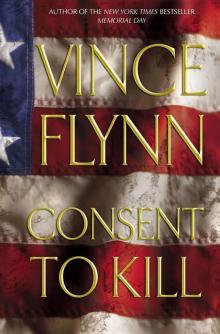 Consent to Kill
Consent to Kill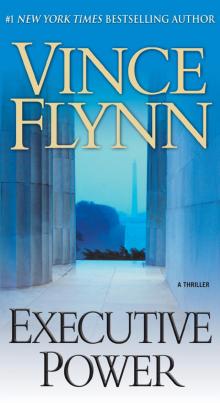 Executive Power
Executive Power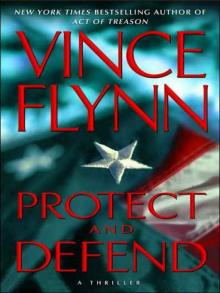 Protect and Defend
Protect and Defend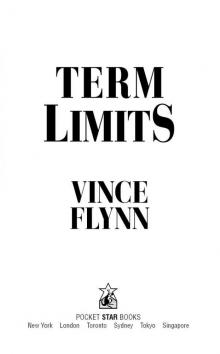 Term Limits
Term Limits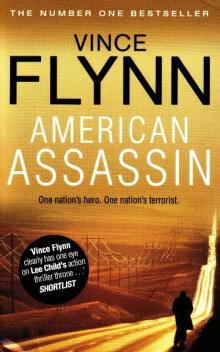 American Assassin
American Assassin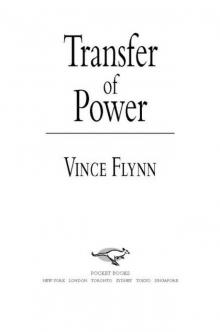 Transfer of Power
Transfer of Power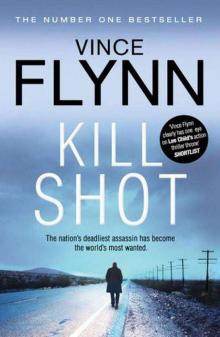 Kill Shot
Kill Shot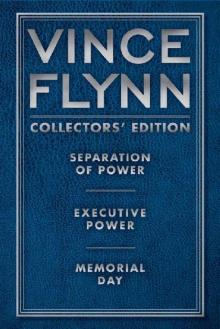 Vince Flynn Collectors' Edition 2
Vince Flynn Collectors' Edition 2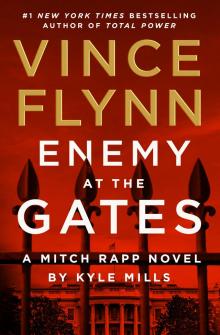 Enemy at the Gates
Enemy at the Gates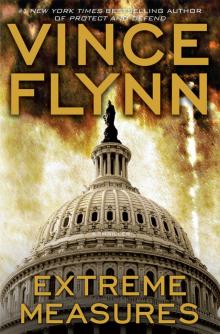 Extreme Measures
Extreme Measures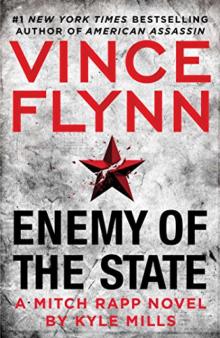 Enemy of the State
Enemy of the State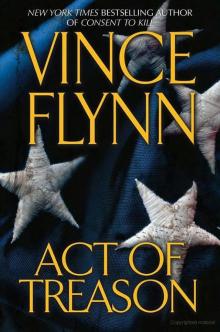 Act of Treason
Act of Treason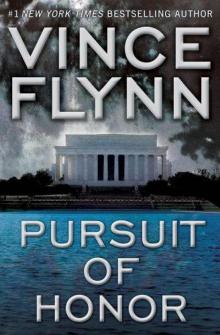 Pursuit of Honor
Pursuit of Honor The Survivor
The Survivor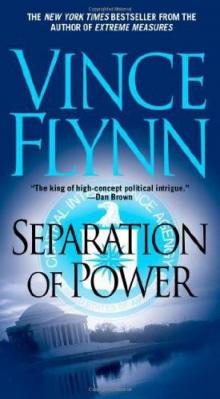 Separation of Power
Separation of Power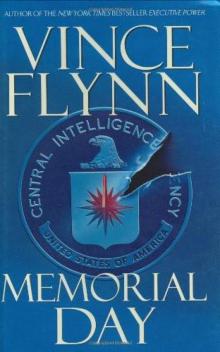 Memorial Day
Memorial Day The Last Man
The Last Man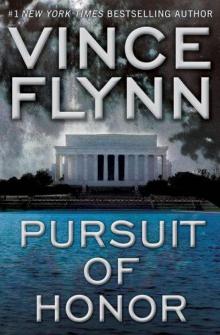 Pursuit of Honor_A Thriller
Pursuit of Honor_A Thriller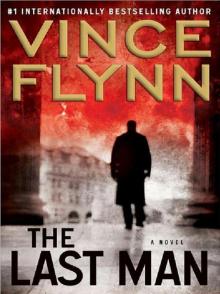 Mitch Rapp 13 - The Last Man
Mitch Rapp 13 - The Last Man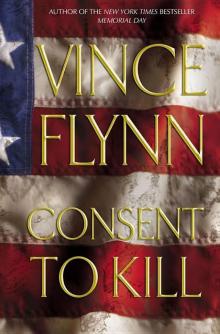 Consent to Kill:
Consent to Kill: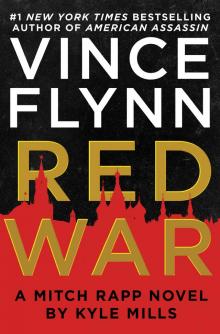 Red War
Red War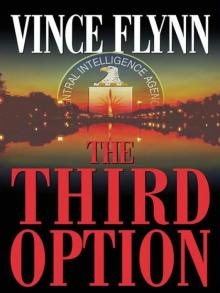 Mitch Rapp 02 - The Third Option
Mitch Rapp 02 - The Third Option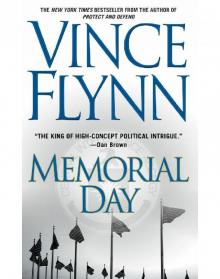 Mitch Rapp 05 - Memorial Day
Mitch Rapp 05 - Memorial Day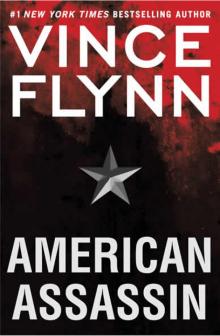 Mitch Rapp 11 - American Assassin
Mitch Rapp 11 - American Assassin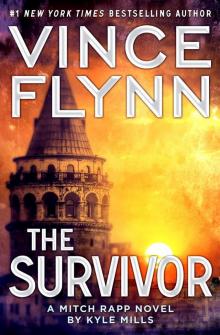 Mitch Rapp 14 - The Survivor
Mitch Rapp 14 - The Survivor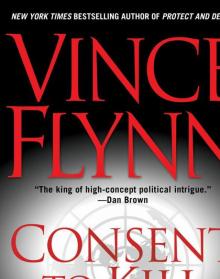 Mitch Rapp 06 - Consent to Kill
Mitch Rapp 06 - Consent to Kill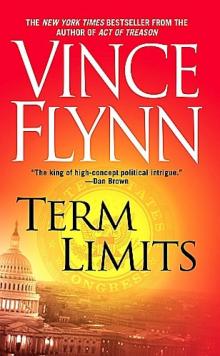 Term Limits mr-1
Term Limits mr-1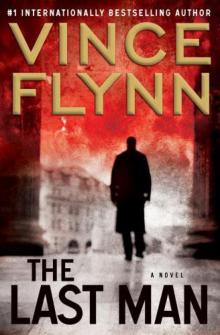 The Last Man mr-13
The Last Man mr-13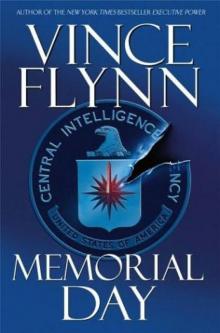 Memorial Day mr-5
Memorial Day mr-5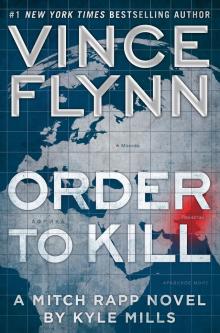 Order to Kill
Order to Kill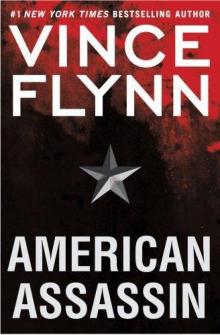 American Assassin: A Thriller
American Assassin: A Thriller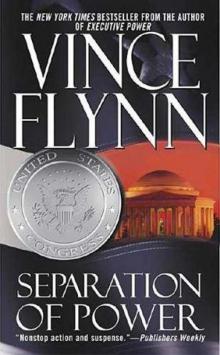 Separation of Power mr-3
Separation of Power mr-3